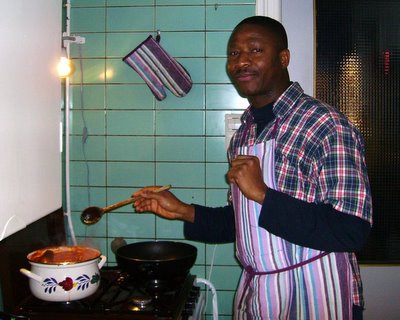
For Senegalese food, I did not need to travel farther than my own building! I often smell delicious aromas wafting from Andrea's kitchen, but I'm never sure if it is her Dutch cooking or Moussa's Senegalese cuisine. I should be able to tell the difference, I guess. Tonight will be my first ever taste of what Moussa calls "the national dish of Senegal", Thiebou Dieune.
I take a peek while he is slaving away in the kitchen, and it looks really good. I spot a yellow pepper in the pan, and ask if it is a Scotch Bonnet. Moussa answers he knows it as a Tyson, named after the fiery boxer! I wonder how they called it before Mike Tyson was well known...
 While the rice is cooking, I amuse myself by listening to Elias, Andrea and Moussa's 17 month old son. If there was a "Animal Sound" competition for toddlers, he would surely win first prize! If you say "Pig!", he makes a very authentic snorting sound with his nose, "Cat!" a meow, and "Snake!" a convincing hissing noise. And that's only a small sample of his repertoire...
While the rice is cooking, I amuse myself by listening to Elias, Andrea and Moussa's 17 month old son. If there was a "Animal Sound" competition for toddlers, he would surely win first prize! If you say "Pig!", he makes a very authentic snorting sound with his nose, "Cat!" a meow, and "Snake!" a convincing hissing noise. And that's only a small sample of his repertoire...He is being raised bilingually; Moussa speaks to him in French and Dutch, Andrea only in Dutch.
Besides his mother tongue, Wolof, Moussa also speaks French, English and Dutch. But he avowes Dutch is by far the most difficult. He actually met Andrea as a language student; she was his Dutch teacher. We talk about how many people perceive you as stupid if you do not master their language perfectly. My American father, who is a university lecturer in Leiden, is sometimes still frustrated by this fact. (More on him in a meal to come...!)
Back to cooking: Moussa tells me he could have chosen to make several other typical dishes, but thiebou dieune really is what Senegalese eat almost every day.
Other options would have been Senegalese couscous (very difficult to come by in the Netherlands) or mafé, a peanut butter stew with meat.
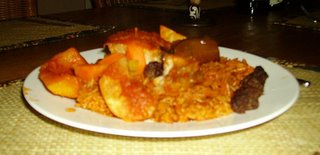 Tonight's thiebou dieune seems quite elaborate for a dish that is served every evening. The main ingredient is rice, with fish, tiny meatballs, okra, aubergine, pumpkin, carrot and cassava. Andrea pictures the Senegalese women spending hours every day just preparing the evening meal. Traditionally, men are not supposed to cook in Senegal. Moussa laughingly explains that his mother would hardly let him into the kitchen. He only learned to prepare the Senegalese dishes in the Netherlands, aided by his memories of how had seen it being done back home. He explains how fish is the most common source of protein, though beef and chicken are popular as well. Pork is not common, as the overwhelming majority of Senegalese adheres to islamic beliefs. But the small Christian minority does keep pigs, and that isn't a problem. In Senegal, the different religions live together in peace. Muslims will celebrate Christmas, and Christians will also participate in Muslim holidays, Moussa tells me. You can read an interesting article about this tolerance here.
Tonight's thiebou dieune seems quite elaborate for a dish that is served every evening. The main ingredient is rice, with fish, tiny meatballs, okra, aubergine, pumpkin, carrot and cassava. Andrea pictures the Senegalese women spending hours every day just preparing the evening meal. Traditionally, men are not supposed to cook in Senegal. Moussa laughingly explains that his mother would hardly let him into the kitchen. He only learned to prepare the Senegalese dishes in the Netherlands, aided by his memories of how had seen it being done back home. He explains how fish is the most common source of protein, though beef and chicken are popular as well. Pork is not common, as the overwhelming majority of Senegalese adheres to islamic beliefs. But the small Christian minority does keep pigs, and that isn't a problem. In Senegal, the different religions live together in peace. Muslims will celebrate Christmas, and Christians will also participate in Muslim holidays, Moussa tells me. You can read an interesting article about this tolerance here.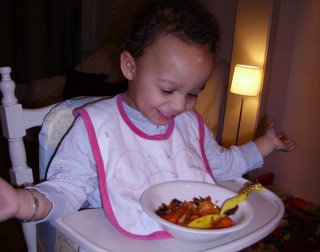 Our meal is accompanied by the sounds of Senegalese musicians. Elias is waving his arms to the music in his high chair. Youssou N'Dour is the most famous, but Baaba Maal and many others have managed to reach wide audiences outside the borders of Senegal.
Our meal is accompanied by the sounds of Senegalese musicians. Elias is waving his arms to the music in his high chair. Youssou N'Dour is the most famous, but Baaba Maal and many others have managed to reach wide audiences outside the borders of Senegal.I have to admit, I don't know that much about Senegal, except that they have a good football team and most of the players seem to be called Diop, Diof or Dioup. (I just checked, and of the 20 players in the current team, there are just two Dioups and one Diop...) Senegal's president between 1981 and 2000 was Abdou Diouf. I haven't been able to find out what this name means and why it is so common.
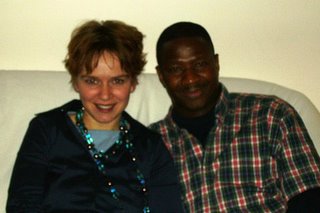
After dinner, Elias is put to bed, we head to the couch and Andrea brings out some vanilla ice cream with home-made elderberry syrup made by her mother. Not something you would find quickly in Senegal! Though Moussa tells us you can find a lot of Dutch powdered milk in Senegalese shops. Our cows are sometimes more international than we are...
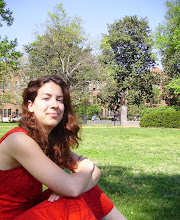
1 comment:
Hi,
I'm an Australian lady who has a Senegalese fiance, he will soon be joining me in Australia. So I started looking up Senegalese food to cook while he is here, so he will not be to home sick for awhile. I hope I can do your Thiebou Dieune justice.I found your site, and enjoy it very much.
Thank you for your blog, and please write some more.
Cheers Dearne
Post a Comment